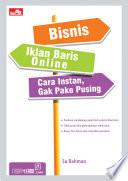
Ultimate Guide to Pay-Per-Click Advertising
Millions compete for exposure on Google and Bing but 99% of them fail to get results. As the founder of leading digital intelligence firm AdGooroo, search advertising authority Richard Stokes is in a unique position to reveal what’s going wrong and provide solutions to fix it. Using proven strategies from today’s search advertising elite, discover how to drive significantly more traffic to your site, dramatically increase click-through rates, steal impressions from competitors, boost your conversions, and increase your sales by unbelievable amounts. Since the previous edition, there have been a number of revolutionary changes in paid search. First, we are increasingly searching from our cell phones rather than desktop computers. Second, Google is no longer the only game in town. Bing now accounts for 30 percent of all U.S. searches. Finally, "search extensions" have become a powerful new technique you can use to collect phone numbers and email addresses with your ads, limit your ads to certain times of day, deliver coupons to nearby customers, and even provide handy "call me" buttons that are displayed only on cell phones. In this new edition, Stokes details all this and more.
- ISBN 13 : 1599185342
- ISBN 10 : 9781599185347
- Judul : Ultimate Guide to Pay-Per-Click Advertising
- Pengarang : Richard Stokes,
- Kategori : Business & Economics
- Penerbit : Entrepreneur Press
- Bahasa : en
- Tahun : 2014
- Halaman : 314
- Google Book : http://books.google.co.id/books?id=PAgBAwAAQBAJ&dq=intitle:pay+per+click&hl=&source=gbs_api
-
Ketersediaan :
... per - action ( CPA ) , 14-15 cost - per - click ( CPC ) , 55–69 ad position and , 65–68 ad spend / average customer value , 62-64 calculation formula for , 55 CPC curves in , 69 , 146–149 , 153-156 Enhanced Campaign and , 280 estimating ...









